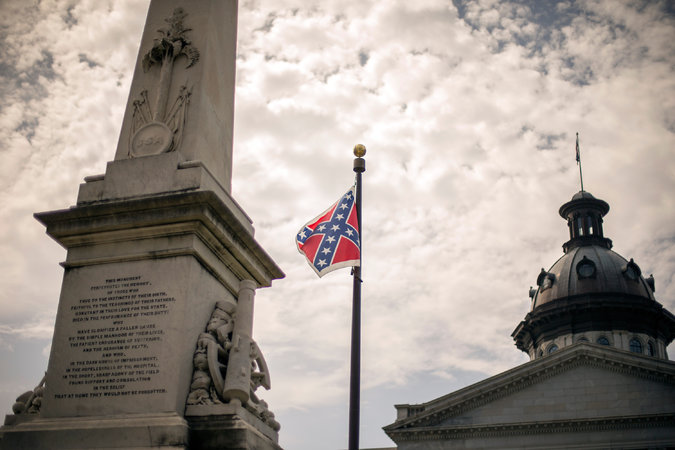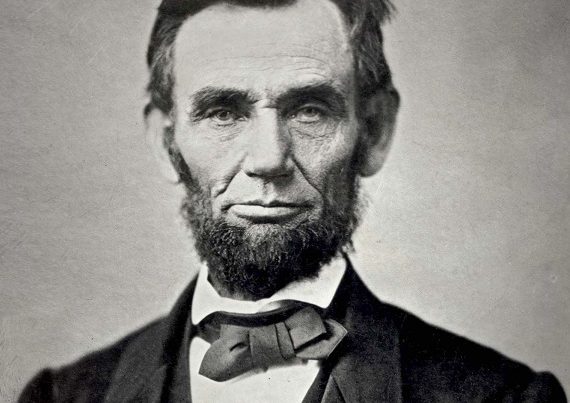This article was orgininally printed in the Unz Review and is reprinted here with permission from the author.
Yesterday afternoon I heard a black civic leader in Columbia, South Carolina being interviewed about the just completed removal of the Confederate Battle Flag from the statehouse grounds. The lady from FOX who did the interview wanted to know about the satisfaction experienced by the black leader in light of the events that had just unfolded. Her interviewee expressed his elation and mentioned the “unbelievable joy” that overwhelmed the black crowd that gathered to see the hated flag come down. “We all hugged each other,” he explained. “We would no longer have to look at it.” This negative reaction to the flag was also expressed by black legislators during the deliberations in the South Carolina senate. The listener was made to believe that American blacks were enduring a continuing nightmare that had created severe emotional problems. It seems this neurasthenia would go on until the hated cloth was dragged down, not only in South Carolina but everywhere else it was displayed. Presumably black crime and social dysfunctionality would also plummet, as all traumatizing symbols of the Confederacy were antiseptically purged.
This black reaction seems to have been totally scripted; and I have no reason to believe that blacks are sickened by the sight of the Battle Flag wherever it’s exhibited. They are engaging in the ritual of being aggrieved. Like other designated victim minorities, including my fellow-Jews, they are full of righteous indignation about past discrimination and symbols of their oppression, whenever the outsider brings up the subject. But 40% of South Carolina blacks in a recent poll cited by Jonah Goldberg registered no objection to seeing the Battle Flag flying from the statehouse grounds; and several years ago, whites and blacks voted in Mississippi to retain the state flag, which contains a Confederate Battle Flag design. In Mississippi GOP leaders tried to dump the state flag.
The most interesting aspect of the war against Confederate symbols is not its predictable backing from black activist groups or the leftist media or members of the Rainbow Coalition. Those are the sources of support one would expect to find in this campaign. Far more striking is the overwhelming, effusive help that is coming from elements of what is imagined to be the conservative movement. Whether we look at the Murdoch media, listen to Republican office-holders throughout the South, or read statements prepared for our capitalist CEOs, the message is hardly different from that of black civil rights activists and organizational heads. Not at all surprising is the evidence of the usual Republican game of triangulating, which takes the form of doing anything to win groups on the left while assuming that what there is of a Right will stay with the GOP. Unfortunately, this game has done very well among Southern whites, who continue to vote overwhelmingly for any so-called moderate the party throws at them, whether McCain, W, or Lindsey Graham.
Among neoconservatives, the repugnance for Southern white society and culture has long been evident, and it seems that one encounters escalating effusions of hate from neoconservative celebrities that were it directed against their own ethnicity would evoke understandable outrage. Just the other day the latest neocon candidate for the title “hating Southerners the most” Jeff Jacoby ranted in all the usual venues of conservatism, inc. that the Battle Flag banner “is the emblem of the most poisonous ideologies in our national history.” Jacoby fulminated against “the hatefulness of the proposition” for which Southern soldiers “were prepared to kill or be killed.” One wonders whether authorized “conservative” sources would publish the invective of a Palestinian whose family had been expelled from their land by Israeli soldiers if he offered a similar rant against the Israeli flag. Just wondering!
What has struck me perhaps the most about this dispute over Confederate symbols is how Republican governors and congressmen have been acting throughout the American South. They have been frenetically dumping on the symbols of their ancestors’ heroism, which they regard as an offense against the black race. Somehow I doubt any of this self-rejection will cost Southern politicians their positions. Opposition to their actions has not been as vocal as one might have expected. While the Left held large demonstrations against the Battle Flag and the retention of the names of Confederate heroes on Southern streets and Southern monuments, the defenders of the Southern heritage were far less visible on the streets. Despite the valiant efforts of my friend Richard Hines and his daughter Kathleen to mobilize resistance against the anti-Southern Left in South Carolina, their efforts have not yielded promising results. Politicians have gone with the media flow and avoided any visible celebration of Jeff Jacoby’s object of hate. It was also instructive to hear white Republicans in the South Carolina Senate apologizing to irate blacks for not having voted to remove the flag sooner. I could not even imagine Japanese, Jews, blacks or members of any one of a multitude of other ethnic groups behaving with such obsequiousness toward those who scorn them and their ancestors. Why the Southern whites have been reduced to this undignified posture is a question that warrants investigation.
Close Southern friends of mine, including the historian Boyd Cathey and the former federal judge Samuel Currin in North Carolina and Professor Clyde Wilson in South Carolina, blame this unsettling change in their region on the corrupting influence of the Republican Party. Once Southerners switched in the 1960s from the Dixiecrat wing of the Democratic Party (which had lost any standing among the national Democrats) to the GOP, they joined a party over which they had little long-term control. The Republicans felt free to spurn the Southern white heritage, and their propagandists could even spew hatred on it while appealing to the party’s Northern base and while trying to expand its appeal among racial minorities. Moreover, Southern whites went along with the GOP, no matter how often it attacked Confederate icons and symbols and no matter how often it placed Southern districts under prolonged federal supervision because of the evidence of low black voter turnout in the South before the civil rights revolution. All the same, Southern whites did get one big prize from the Republican command, military bases and military operations from which their region has benefited disproportionately. They were also given the opportunity to vent their proverbial bellicosity, which was conspicuous by its absence during the Battle Flag crisis, by volunteering to kill the enemies of “American democracy.”
Although I shall readily concede that white Southerners made a Devil’s pact with the GOP, it seems that something more may be at work in what has occurred in the white South. Like other parts of the country, the South has been exposed to the media, public education, and popular culture, all forces that tilt strongly toward the left. And while these vehicles of indoctrination treat some groups as noble victims, Southern whites are not among them. More typically Southern whites, especially before the present era, are depicted as stupid bigots and religious fanatics, and certainly not shown in a way that the young would want to identify with.
I would also assume that like other predominantly Northern European Protestant societies analyzed in my books, Southern whites are wracked by social guilt that political, religious and cultural elites have all contributed to instilling. It is unlikely that those Republicans I saw bowing and scraping before hostile blacks were simply looking out for their political careers. They seemed anguished by the disfavor shown by a group they were supposed to have victimized, the way George W. Bush was when he was attacked by a black Democrat as a racist. When such a usually stalwart figure of the Right as Senator Jeff Sessions of Alabama laments that the Battle Flag had been “commandeered for anti-civil rights”; and that though a revered ancestor of his fell at Antietam fighting for the Southern cause, he is conflicted by the issue before the South Carolina senate, I have no reason to think Sessions is triangulating. Even traditional Southerner have been made to feel ashamed of their politically incorrect past.
On another topic, allow me to note that I think the battle over the Battle Flag has nothing to do with hating blacks and perhaps increasingly less to do with the War Between the States (which is misleadingly designated in the US as a “civil war.”) It has become a symbol of rebellion against an overreaching, highly centralized managerial regime, and it was not by accident that those protesting Soviet control in the 1980s waved the Confederate Battle Flag in public demonstrations. This banner no more indicates a predilection for black bondage than the appearance a few years ago of the Cathar flag in Toulouse and other cities in Languedoc signified the reemergence of the gnostic heresy that once swept southwestern France. This heresy, which treats physical desire, including procreation, as totally evil, led to a crusade against the Cathars (or Albigensians) in the twelfth century, in which many in their region were slaughtered. Curiously the celebration of the Cathars (that is, those who are cleansed in Greek) has now spread to gay and lesbian groups, since the adherents of this strange cult considered procreative sex between men and women to be particularly loathsome. Flags assume changing meanings as historical circumstances undergo change.
I must also question whether the American flag, which the KKK happily waved for many decades and carried in a mass parade in Washington, D.C. in 1925, will be pulled down next. Unless I’m mistaken, it seems that the large Klan representations produced by such states as Indiana and New Jersey typically featured the Union flag, not the Battle Flag. But this is all rather academic. The ruling class has too much invested in the American national flag, which is now intertwined with such interests as aggressive liberal internationalism, the civil rights movement, and the reign of our first black and certainly most leftist American president, to give up the national banner. Old Glory is here to stay, no matter how loudly some defenders of the Battle Flag have been warning us that the American flag is next on the hit list. If the establishment decides to go after another offensive symbol, it may be a Christian cross, perhaps on the Maryland state flag. Although Southern white Christians may have pride of place in the media rogues’ gallery, devout Christians are not far behind.







